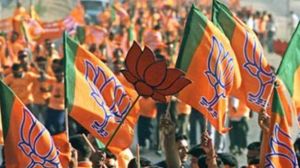Living with the pink slip
The bubble has burst. How is a generation reared on fat pay cheques and ambition going to cope?
The bubble has burst. How is a generation reared on fat pay cheques and ambition going to cope?
Twenty-three-year-old Shaira Gupta confesses she is a shopaholic with a fetish for clothes,bags and shoes. A fetish she had no problem indulging in over the past three years as a flight attendant with Jet Airways,earning over Rs 60,000 a month. Three weeks ago,she was sacked. Even till September last year,I was flying over 100 hours a month, says Gupta. With the airline cutting down its operations on many sectors,several crew members flying time was reduced. The threat of layoffs was constant but even so it is a hard knock to take. The young woman is often in the grip of anxiety attacks these days. She has enough savings in the bank to afford living in Mumbai for a few months more and is looking for jobs in call centres and the hospitality sector. Else shell have to head back to her parents home in Kolkata,a prospect she dreads.
Its a crisis an entire generation of young Indians who entered the job market during boom time and quickly settled into the have-money-will-splurge lifestyle are facing. They have few answers.
Government and industry estimates say 10 lakh jobs have been lost across sectors since last September. With more bad news predicted this year,a shaky stock market and stagnant growth,the frugality of previous generations,who hoarded for the future and treated success with caution,seems like smart thinking now.
Being laid off is right up there as one of the most life-altering moments an individual can face. According to psychiatrists,emotionally,it can be as bad as losing a loved one or getting divorced. Rachna Singh,a psychologist and lifestyle consultant at Artemis Hospital,Gurgaon,says she gets 15 patients a day who have suddenly lost their jobs.
Its not a trauma that they are ready to admit to. Many reveal the cause of their distress after several counselling sessions,says Dr Singh. People are coming with symptoms like poor decision-making,sleeplessness and lack of motivation. After a few sessions,we figure out the patient got fired, says Dr Singh. Job-related stress is the highest she has seen in her seven-year career.
She narrates how a 38-year-old man with school-going children sunk into deep depression after being fired from his job in a software firm. The thought of not being able to maintain his lifestyle and the pressure of EMIs meant he hadnt slept for nights. The toughest part is meeting friends and family and admitting you were fired, says Dr Singh. In India,its very demeaning. If you say you were sacked,people automatically think you were the lousiest employee in the company. Theres no understanding that you were a mere casualty of a global meltdown.
Chandigarh-based Jai Singh,27,till recently a researcher in the software sector,actually waves a pink slip at our meeting over coffee. I celebrated my first month of being jobless yesterday, he jokes wryly,I guess my marriage prospects are at an all-time low. Singh says he often bumps into people at parties and get-togethers who are suddenly jobless or expecting the worst. But nobody is acknowledging it yet. It takes six months to get over the initial anger and frustration and come to accept it, says Singh,who says he has taken the lay-off quite well.
But then he saw it coming. My boss kept telling us the company was doing badly for a few months. Then he said those who wanted to leave could,and he threw in some numbers of employment consultancies too, says Singh. He has been spending time on job sites posting his resume but what used to be an inbox packed with posts from placement agencies now barely attracts a stray e-mail or two.
Singh remains optimistic. His plan is to directly approach companies since even they cant afford to advertise. Its very tough, he admits. Every company now has conditions. Last year,if you scored a four out of 10,theyd take you. Now even an 11 out of 10 guarantees nothing, he says.
The rules have certainly changed. Its an employer-driven market. There was a slowdown in the IT industry in 2002 but other sectors in India were doing well. This time round,everything from automobiles,banking and exports are going through a massive churning with job cuts at every level. In the information technology IT industry,Sapient let 400 employees go two weeks ago while Citi Financial fired over 2,000 people. Five lakh people lost export-related jobs in 2008.
Psychologists prescribe the ABC approach to firings. A for awareness to accept the problem,B for balance to weigh the positives and negatives,and C for control and figuring out an action plan, explains Dr Singh.
Advising perspective is easier said than done. In a society where our self-worth is largely determined by what we do and what weve achieved,the first reaction after getting fired is panic,and shock. Deepti Bapat,36,had been with an MNC based in Pune for 12 years and was earning a six-figure salary. Doing well in a job she enjoyed,she never took the rumours in the office very seriously. Till she received a letter,terminating her services. I thought organisations were using the slowdown as an excuse to remove non-performers and I never thought of myself that way, says a shaken Bapat.
She withdrew into her shell completely and couldnt face the condolence calls from family and friends. The first 15 days were hell. Everyone had advice to give. Join another company,sell the house. My six-year-old son would see me and wonder why I was crying, she says. Bapat has cut down on expenses but says she hasnt got over the trauma and embarrassment of being laid off. Time will help me regain confidence and my husband has a stable job. Maybe this is a blessing. I get to spend more time with my child, she says.
Delhi-based career counsellor Geetanjali Aiyar advises middle management professionals without jobs to use this time to take stock of their lives and figure out what they really want. Its a good time to equip yourself with different skills,maybe in languages and technology,so that youre prepared for the next wave of hiring that is bound to come, says Aiyar.
Like Vikas Deepak,27,an engineer and an MBA from IIM Kolkata,who got fired from his job in a telecom company in Bangalore last month. Deepak has spent most of his life either studying all day or working incessantly. He says the toughest part is having so much free time that it makes him nervous and fidgety. Its disorienting to wake up in the morning and have nowhere to go, says Deepak,who earned over Rs 15 lakh per annum till the global slowdown started affecting the company.
Overnight,his colleagues from Europe and China were laid off. Im still lucky I got severance pay of three months. The company filed for bankruptcy and people who were sacked 20 days after me didnt get anything, he says. With no financial liabilities and supportive parents,Deepak is not that badly off. The understanding has begun to seep in that excellent academic credentials dont guarantee a carefree life,free from the stress of that dreaded pink slip.
Initially my family was shocked. Now its happening to so many of my batchmates that its no longer such a big deal, he says. Deepak has enrolled for language courses and plans to travel a bit before deciding his next move.
Meanwhile,Shaira Gupta,the flight attendant,is losing hope over finding another job. But she knows she is better off than others. Two sisters in Jet Airways from Jamshedpur,my colleagues,were supporting their entire family back home before they got fired. At least I have no dependants.
Some names have been changed to protect their identity
_With inputs from Jas Kiran Kapoor in Chandigarh and Pranav Kulkarni in Pune
- 01
- 02
- 03
- 04
- 05































